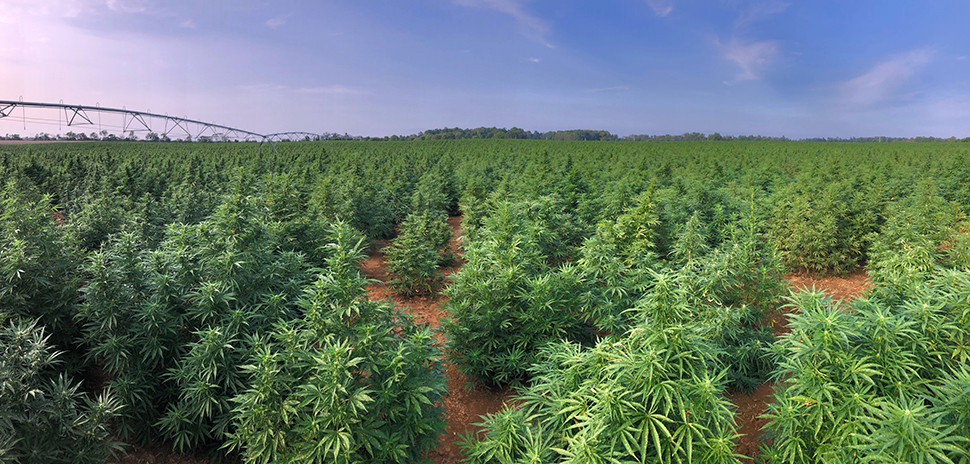Dallas-based Delta Agriculture, formerly Delta Ag Partners, has launched an official rebrand to coincide with the announcement of its new hemp fiber line. The move represents the Dallas-based company’s transition from a hemp flower producer: Now the company says its the nation’s largest industrial producer/processor of raw hemp.
As part of the transition, Delta Agriculture has unveiled a new logo and extensive rebranding built on its goal to make hemp the nation’s leading raw good supply source.
Ultimately the company wants to ensure “America’s trajectory towards a carbon-negative future.”
Delta Agriculture currently operates on more than 5,000 acres of farmland across West Texas, Colorado, and Kentucky, with plans to plant 10,000 acres this year and scale to more than 25,000 acres in 2022.
Hemp absorbs 100,000 tons of carbon dioxide directly from the environment with every 10,000 acres planted. The company says its operations are carbon negative at the outset—offering some of the biggest players in global manufacturing a raw good that can eliminate carbon waste.
What is hemp?
According to Delta Agriculture CEO George Overbey, “hemp is a miracle crop.” Not only does it remove carbon from the air, but it’s also known to nourish the soil and produce biodegradable versions of goods people rely on every day. Plus, it’s renewable.
The company defines hemp as essentially every variety within the cannabis family that contains negligible amounts of tetrahydrocannabinol (THC), the chemical in marijuana that is psychoactive and gets people “high.” While hemp may come from the same type of plant as marijuana, they are not the same.
Hemp is an alternative to synthetic materials due to the unique structure of the plant. Its three main parts are the flower, the grain, and the fiber. Each of these components can be processed into numerous products within various industries.
The flower is the part of the plant that’s utilized in the CBD market. The grain, which is processed by hulling, pressing, and crushing, is used in animal feed, supplements, and cosmetics. Using a method called decortication, the fiber is used to make paper, pulp, and cardboard, insulation and paneling, and bioplastic.
2018 Farm Bill authorized hemp production
Following the 2018 Farm Bill’s authorization of hemp production federally, and the recent legalization of hemp farming in several states including Texas, Delta Agriculture says it now has proprietary technology that allows it to process all parts of the hemp plant (flower, grain, and fiber) as an alternative resource.
Currently, it’s producing flower and fiber at scale. But seed processing won’t be far behind, Overbey says.
“Delta Ag is currently the nation’s top supplier of hemp, scaling at pace to eventually produce enough raw goods to be a sustainable alternative to petroleum-derived plastics, tree-based papers, and other non-renewable products that currently contribute to global pollution and waste,” he said in a release. “Delta Ag is harnessing the power of the hemp plant to make a carbon-negative future possible right here at home and one day, globally.”
A ‘big ag’ approach
Delta Agriculture’s approach to the hemp industry is based on vertical integration—from genetics to raw goods—to offer end-users a consistent and stable supply.
Considering the hemp plant’s short harvest cycle, Delta Agriculture created a flexible approach that adapts to expanded acreage and industry demands. By leveraging proprietary genetics, the company is able to maximize the effectiveness of their hemp seed, which is harvested at a 50,000-square-foot genetics lab in Delta, Colorado.
The team hopes its “big ag” business model will help usher global manufacturing into modern times. They think their hemp method is just as efficient as petroleum-based plastics and other nonrenewable goods, but avoids the waste and pollution those can inflict on the environment.
Delta Agriculture says it’s currently the only company on the market that’s mass producing hemp for industries interested in renewable raw goods as a means to offset carbon footprint and reduce industrial waste.
“As more and more companies seek to reduce their environmental footprint and cut their carbon output, Delta Agriculture is building the infrastructure to make that possible,” Delta Agriculture Chairman John Paul Merritt said in a statement. “We’re providing manufacturers and retailers a real working solution to carbon offsets, rather than the ineffective short-term approach of buying carbon credits, and we’re doing it while creating American jobs.”
![]()
Get on the list.
Dallas Innovates, every day.
Sign up to keep your eye on what’s new and next in Dallas-Fort Worth, every day.




























